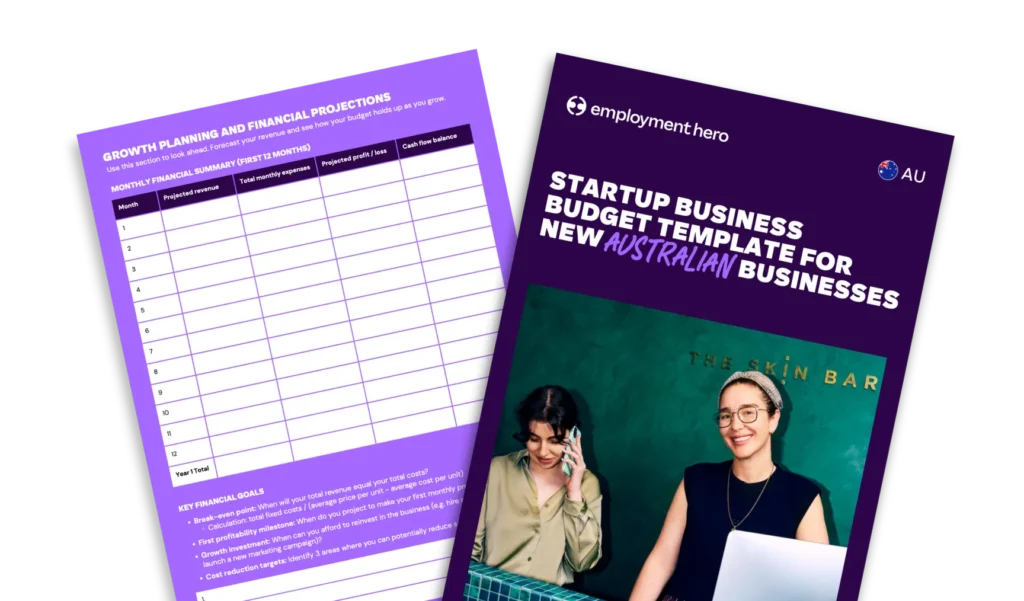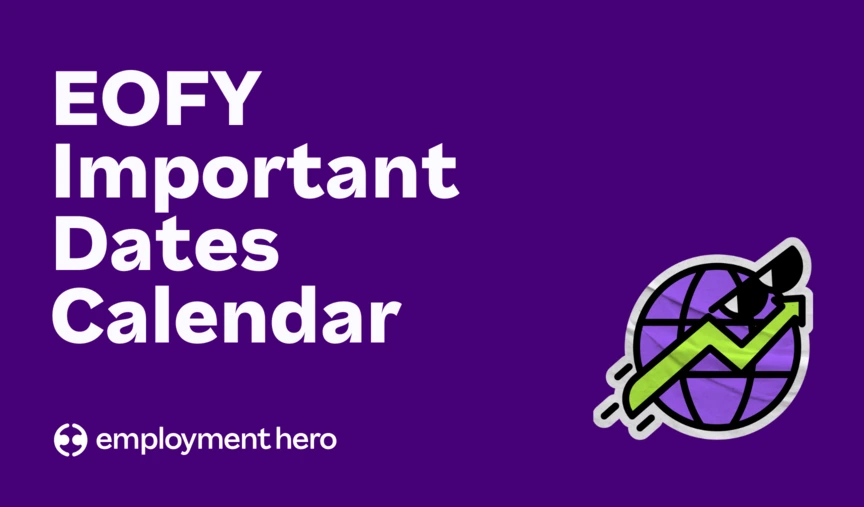Free startup budget template for new business owners
Published
Free startup budget template for new business owners
Launching a new business is a bold move. It takes vision, courage and relentless drive to turn an idea into reality. But passion alone doesn’t guarantee success. To build a sustainable business, you need a firm grip on your finances from day one. That’s where a solid business budget comes in.
This guide breaks down why budgeting is non-negotiable for Australian startups. We’ll walk you through how to use our free startup budget template to master your financial planning, control your spending and set your business up for long-term financial success.
Download the template using the form on the right.

What’s included in this startup budget template?
A clear budget can give you a clear view of your financial health. Our startup budget template is designed to be straightforward yet comprehensive, helping you make informed decisions without getting lost in complex spreadsheets.
Here’s a breakdown of what the template covers:
- Initial setup costs (one-time expenses)
- Ongoing monthly expenses
- Growth planning and financial projections
How to use your startup budget template
Getting started is simple. This template is designed for founders, not accountants. Follow these steps to take control of your startup’s finances.
- Download the template: Get your free copy and open it.
- Enter your business details: Customise the template by adding your business name and details
- Initial setup costs (one-time expenses): List every one-off cost required to launch your business, such as equipment, software, legal fees, licences and branding to calculate the total startup capital you’ll need.
- Ongoing monthly expenses: Record your regular monthly costs, both fixed (like rent or salaries) and variable (like marketing or supplies), to understand your ongoing financial commitments and cash-flow needs.
- Growth planning and financial projections: Use realistic revenue forecasts and cost estimates to project your cash flow and profitability, helping you plan for scaling, investment and long-term sustainability.

Common business costs for startups
Every business is different, but most startups face similar initial expenses. Forgetting even one can have a significant impact on your cash flow. Here are some common startup costs to include in your budget.
Business registration and licensing fees
Before you can operate, you need to be official. This includes costs for registering your business name, applying for an Australian Business Number (ABN) and securing any necessary permits or licences specific to your industry.
Equipment, tools, or software
Think about everything you need to run your business operations. This could be laptops, machinery, point-of-sale systems or specialised software. You’ll also want to consider tools for payroll, accounting and project management.
Website development and marketing costs
Your online presence is crucial. Budget for website design, hosting, domain registration and initial marketing campaigns. This could include social media ads, content creation, or search engine optimisation (SEO).
Insurance and legal fees
Protect your business from risk. You’ll need to budget for public liability insurance, professional indemnity insurance and workers’ compensation if you have employees. It’s also wise to set aside funds for legal advice on contracts or business structure.
Employee wages and superannuation
If you plan to hire, your biggest recurring expense will likely be payroll. Factor in salaries, superannuation contributions and payroll taxes. Accurate payroll is critical for compliance, so make sure you understand your obligations. Our payroll guide can help you navigate these complexities.
Office or coworking space rent
Whether you’re renting a dedicated office, a desk in a coworking space, or setting up a home office, there are associated costs. This includes rent, utilities, internet and office supplies.

How to reduce budget spend as a startup
A tight budget forces you to be resourceful and creative. Here are a few strategies for managing expenses without sacrificing growth.
Using free or low-cost software tools
Many essential business functions can be managed with free or affordable software. Look for tools that offer freemium plans that can scale with you. For example, you can find excellent options for project management, communication and design that won’t break the bank.
Outsourcing instead of hiring full-time staff
Hiring a full-time employee involves significant overhead costs beyond their salary. Consider outsourcing specific tasks like bookkeeping, marketing or even payroll. With a service like managed payroll, you can ensure your team is paid correctly and on time without needing an in-house expert.
Negotiating with suppliers
Don’t be afraid to negotiate prices with your vendors and suppliers. Many are willing to offer discounts for long-term contracts or bulk purchases. Building strong relationships can lead to better terms and lower overhead costs over time.
Leveraging government grants or startup incentives in Australia
The Australian government offers various grants and incentives for startups. Do your research to see if your business qualifies for programs like the R&D Tax Incentive or other industry-specific funding opportunities. These can provide a significant boost to your cash flow.
Why budgeting is critical for startups in Australia
Australia presents a unique environment for new businesses. High operating costs and strict regulations mean that strong financial planning is essential for survival.
A detailed business budget helps you manage your cash flow, which is the lifeblood of any startup. Many businesses fail in their first year not because they aren’t profitable, but because they run out of cash. By tracking your income and expenses with a budget template, you can anticipate shortfalls and make proactive decisions.
Common budgeting mistakes startups make
Avoid these common pitfalls that can derail a new business:
- Overestimating revenue: Optimism is great, but your financial forecasts must be grounded in reality. Base your projected revenue on solid market research instead of wishful thinking.
- Underestimating costs: It’s easy to forget small, recurring expenses that add up over time. Be thorough when listing your operational expenses and add a buffer for unexpected expenses.
- No contingency plan: What happens if your sales are slower than expected or a key piece of equipment breaks? A good budget includes a contingency fund to handle surprises without derailing your business. A payroll continuity checklist is a great way to prepare for unexpected disruptions.
- Forgetting about taxes: Don’t treat tax and compliance costs as an afterthought. Budget for GST, income tax and payroll tax from the very beginning.
Download your free startup budget template
Building a successful business starts with a solid financial foundation. A budget is your roadmap, guiding your decisions and keeping you on track toward your goals. Our startup budget template simplifies the process, giving you confidence to manage your finances effectively.
Whether you’re looking for small business payroll software or a way to plan for your financial future, the right tools make all the difference.
Download our startup budget template now by filling out the form.
Disclaimer: The information in this template is current as at November 2025, and has been prepared by Employment Hero Pty Ltd (ABN 11 160 047 709) and its related bodies corporate (Employment Hero). The views expressed in this template are general information only, are provided in good faith to assist employers and their employees, and should not be relied on as professional advice. The Information is based on data supplied by third parties. While such data is believed to be accurate, it has not been independently verified and no warranties are given that it is complete, accurate, up to date or fit for the purpose for which it is required. Employment Hero does not accept responsibility for any inaccuracy in such data and is not liable for any loss or damages arising either directly or indirectly as a result of reliance on, use of or inability to use any information provided in this template. You should undertake your own research and to seek professional advice before making any decisions or relying on the information in this template.
Register for the template
Related Resources
-
 Read more: EOFY Important Dates Calendar
Read more: EOFY Important Dates CalendarEOFY Important Dates Calendar
Gearing up for EOFY? To help you prepare, we’ve put together a calendar of important dates to support you through…

























